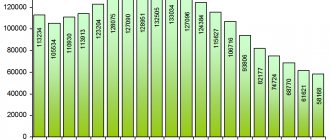Deprivation of parental rights to the child's mother is carried out in accordance with the provisions of Art. 69 and art. 70 IC RF. The legislation does not establish separate rules for depriving the rights of a father or mother, therefore a statement of claim is filed according to the general rules. At the same time, depriving a mother of her rights is much more difficult than depriving a child’s father, as judicial practice shows.
Important! In the case of going to court regarding the mother of a minor, you will have to provide more detailed evidence of the woman’s insolvency, since according to the established legal tradition, courts treat women more favorably due to their more responsible attitude towards the child, except in cases of direct harm to the minor.
Deprivation of mother's parental rights - general provisions
Deprivation of a mother's parental rights is a legal procedure that is aimed at removing a woman from the responsibilities of raising a child.
The essence of this procedure is the legal termination of the relationship of a related nature between mother and child. Deprivation of rights is the most severe measure that the court can apply.
As a rule, the rights are limited first, but if the parent does not correct his behavior for the better, then the court is forced to deprive the rights.
If a minor is in real danger, his life and health are harmed, then the court can deprive the mother of her rights immediately, even without restrictions. Once the court makes a decision on deprivation, the decision comes into force.
After the court decision comes into force, the mother loses the opportunity to exercise her rights for an indefinite amount of time.
The purpose of deprivation is to protect and restore the violated rights of the child, restore normal conditions for his life, protect his interests and health.
Despite the fact that the mother will lose her rights in relation to the minor, she will still be required to fulfill some duties. For example, providing for a minor will still be her responsibility, according to Article 71 of the Family Code of the Russian Federation.
An example from judicial practice
In judicial practice there are many examples of deprivation of parental rights for each of the six grounds.
Deprivation of parental rights on the basis of abuse of them
In 2003, a Moscow court deprived the mother, citizen L, of parental rights for abuse and failure to fulfill her duties in relation to her son and daughter. The initiators of the case were the teachers of the school where the eldest son of citizen L was enrolled. According to their statement, the child has not been going to school for more than three years. As a result of checking the living conditions, it was found that the family lives in a three-room apartment - citizen L. herself lives in the first room with her partner and young daughter, the son and father of citizen L., who is registered in a mental hospital, live in the second room, and the third room is rented out to rent for four people.
Also, the guardianship and trusteeship authorities established inadequate care for children, revealing their exhaustion, unkempt condition, developmental delay, and lack of sleeping places for children. This was confirmed by the testimony of neighbors, who also said that the police regularly come to the apartment on calls about brawls and fights. In addition, it was established that the defendant’s minor son was repeatedly charged with cases of theft and hooliganism. The result of the trial was the satisfaction of the prosecutor's demands and the decision to deprive the defendant of parental rights.
Issues of deprivation and restoration of parental rights often require the involvement of experienced lawyers who will help not only to understand the intricacies of the current legislation, but also to achieve maximum protection of the rights and interests of the minor participant in the dispute.
Grounds for deprivation of parental rights
Due to their age, persons who have not reached the age of majority cannot defend their rights themselves. Until they reach the age of eighteen, the parents or legal representatives of minors must bear full responsibility.
The state is also responsible for children. The most important person who is responsible for a child is his mother. But some women perform their duties in bad faith, causing a negative impact on their children.
But in order to deprive a mother of parental rights, there must be compelling reasons, since this measure is quite severe and is used in extreme cases.
Article 69 of the Family Code of the Russian Federation specifies the grounds under which a mother may be deprived of parental rights. Let's take a closer look at these reasons:
- The mother avoids fulfilling her obligations towards the minor, namely, she does not want to raise and support the child. The woman ignores his interests, does not want to be responsible for his mental and physical health, for his condition in general.
- The parent does not want to take the minor home from a medical or educational organization (from a hospital, from a maternity hospital, from a kindergarten, etc.). There is only one exception here, if the minor is in a specialized institution due to his mental or physical characteristics.
- A woman abuses her parental rights, namely, she engages in coercion or inducement of a child to take actions of a negative nature. For example, it forces you to steal, engage in prostitution, beg, distribute drugs, etc.
- The mother abuses the minor, namely, uses brute physical force against him. This also includes causing psychological suffering to a child. For example, threats, beatings, humiliation of honor and dignity, etc.
- The parent has a chronic addiction to alcohol or drugs. The court has a medical report that confirms the presence of addiction. Alcohol and drug use by the mother can cause significant harm to the minor.
- The woman has committed a crime against a minor or her husband. The mother is deprived of her rights after the court's guilty decision comes into force. If a woman has committed a crime through negligence, she is not deprived of her rights.
Important! The above grounds should be interpreted in precisely these terms.
No one has the right to arbitrarily expand or change them. If at least one reason is confirmed, the court will decide that the mother is deprived of parental rights.
In all of the above situations, the court is simply obliged to deprive the woman of her rights, since the minor is not only in poor conditions, but there is also a threat to his life and health.
In addition to the grounds that are significant, the court also takes into account additional facts in the aggregate when making a decision.
Additional facts may influence the decision in either direction. Additional reasons that the court will take into account may include the following facts:
- The mother does not provide the minor with normal living conditions. For example, living quarters are in poor condition, there is no proper nutrition, there is no necessary clothing, etc.
- A woman violates safety rules. For example, he leaves a small child alone at home or leaves him alone on the street.
- The parent does not take the minor to medical institutions in order to check his health condition.
- The mother does not work with the child, does not help him develop the necessary everyday and social skills.
- The woman does not educate the minor and does not take him to school.
- The mother does not communicate with the child and is not interested in his spiritual state.
All of the above reasons may serve as additional facts that the court will take into account in conjunction with significant grounds.
Examples
The court was considering a case of deprivation of parental rights against a woman who left her children in an unheated house in winter. She left and did not return for several days. There were two children, two and three years old, in the house. Due to the fact that the room was not heated, one child died, and the second was taken to intensive care with severe frostbite. In this case, the court did not consider the mother’s negligence, but intentional damage to health resulting in death. The woman was convicted. In addition, the court deprived her of parental rights in relation to the surviving minor.
Another case concerned abuse of rights. After the divorce, the court decided to leave the minor with the mother, imposing the obligation on the father to pay alimony. The latter earned quite well. The amount of alimony that the father paid was almost twice the mother's salary. The woman, taking advantage of this, quit her job and began to live for her own pleasure, becoming addicted to alcohol. As a result, raising a child took a back seat. The parents of the ex-husband insisted that he file an application with the court. The arguments presented were sufficient to satisfy the requirement. As a result, the mother was deprived of her rights to the child.
Package of documents for deprivation
In order to deprive the mother of parental rights, you need to contact the guardianship and trusteeship authority. After the relatives apply there, the authorities will consider the application within three days and make a decision.
Based on this decision, the case will be sent to court for consideration.
If the father wishes to file a claim in court in order to deprive the mother of her rights, he needs to prepare the following package of documents:
- certificate and registration or divorce (if the marriage is official);
- child's birth certificate;
- certificates confirming the inspection of the housing of both parents;
- characterization of the mother obtained at her work;
- characterization of the father obtained at his work;
- income certificates of both parents;
- a medical certificate confirming that the woman is addicted to drugs or alcohol;
- testimony of witnesses, educators, teachers who will confirm that the mother is a negative person;
- a medical certificate stating that the minor was harmed;
- conclusion from the guardianship and trusteeship authorities, which characterizes the mother as a parent;
- a certificate from the police station stating that the child or father was harmed.
Depending on each specific situation, the package of documents can be expanded or, conversely, reduced.
How to correctly draw up a statement of claim for deprivation of a mother’s rights?
After close relatives have tried to influence the mother’s behavior, the question arises of where to start filing a claim. To draw it up correctly, it is best to turn to the services of professionals. However, if this is not possible, it’s okay - you can write such a paper yourself.
In order for an application to be accepted by a court, it must first be drafted correctly. Inaccuracies, errors and blots in the application are not allowed.
So, a sample claim to court can be presented as follows:
- The “header” of the document, which indicates the name, address of the court, information about the plaintiff and defendant (full name, address), information about the guardianship representative and information about the prosecutor’s office.
- The “body” of the application includes: a brief summary of the current situation, an indication of the violation of the law with links to specific articles. As well as the plaintiff's claims against the defendant.
- At the end of the document, a list of documents attached to it is compiled, the number and signature of the applicant are put.
When deprivation of a mother's parental rights does not apply
It is not always possible to deprive a mother of parental rights. For example, if there are no significant grounds or there is not enough evidence that the parent is not fulfilling her duties.
In addition, the judge must comprehensively examine all the evidence and materials of the case. Sometimes a mother behaves inappropriately regardless of her will. This may happen due to some difficult life circumstances.
For example, a woman is seriously ill or suffers from a mental disorder.
In such cases, the mother cannot raise her child herself, but the court will not deprive her of her rights for this.
Important! If a parent has a disability of any group, she must still provide financial support for the minor. The alimony will be deducted from her disability pension.
Why might this be needed?
The reasons why a man may decide to deprive his mother of parental rights can be very diverse. But in any case, the law is on the side of the child, and the main task of the executive authorities is to ensure his safety, as well as a decent standard of living. Therefore, in judicial practice, most often there are cases in which the father intends to deprive a woman of maternal rights due to the fact that she does not properly care for her own children or causes harm to them.
But other situations also occur. For example, after a divorce, the ex-spouse (or his relatives) may try in every possible way to take the child away in order to raise him independently in his family. In addition, the father, with whom the minor remained after the divorce by court decision, may wish to create a new full-fledged unit of society and achieve the adoption (or adoption) of the child by the new wife.
The procedure for deprivation
The mother can be deprived of her parental rights only by a court decision.
- To do this, a statement of claim must be filed, and all evidence must be attached that there are compelling reasons for applying this measure. The application can be submitted by the father of the minor, his legal representative, an employee of the prosecutor's office, or the guardianship and trusteeship authority. A representative of the educational or medical organization in which the child is located can also go to court. The claim must contain an indication of exactly which right of the child the mother is violating.
- If a representative takes part in the court case, he will be given a power of attorney certified by a notary. In the case of deprivation of a parent's rights, the prosecutor must take part.
- The judge listens to all persons who are parties to the case and also considers all the evidence presented. When making any decision, the judge takes into account the opinion of the guardianship and trusteeship authorities, since it is this body that protects children's rights. The opinion of the doctor, teacher, psychologist who communicate with the minor can also be taken into account.
- The court makes a decision either in favor of the mother or in favor of the applicant, and still deprives the woman of her rights. After the decision is made, the information is submitted to the registry office. Civil registry office employees make a note in the documents relating to the birth of the child.
How to deprive a mother who drinks of parental rights?
According to the law, the presence of alcohol dependence is a valid basis for filing a claim for deprivation of parental rights in court. However, in practice, if the defendant appears in court in a sober state, the court almost always meets him halfway and gives him a chance for correction, only limiting the parent’s rights, but not depriving them.
During the period of correction, the guardianship and trusteeship authorities maintain strict control over the defendant’s family, conduct checks and record changes occurring in the relationship between mother and child. Based on the results of the allotted time for correction, if there are no changes in the mother’s behavior, she is deprived of parental rights.
When filing a claim with the court for deprivation of parental rights of a mother who has an alcohol addiction, it is necessary to attach documents confirming this fact - a certificate from the police or from a first aid station, from a psychoneurological dispensary, testimony from work colleagues or neighbors at the place of residence.
Consequences of depriving a mother of parental rights
The rights of a woman who has been deprived of parental rights are either canceled in full or may be curtailed.
In this case, the minor is given to his father to live together. Now his father will take care of his upbringing. If the child does not have a father, then where the minor will live is decided by the guardianship and trusteeship authorities.
If the mother does not regain her rights, the child may be adopted by strangers.
Before reinstating the mother’s rights, the child’s opinion is also taken into account, but only if he is already ten years old. The woman is obliged to pay alimony to the minor, but the mother no longer has the right to receive alimony from him in the future. The mother will also not receive benefits and benefits for the child.
If a mother is deprived of rights in relation to a child who is entitled to maternity capital, then she loses it. A minor has the right to live in the same place where he lived with his mother, but the mother can be evicted by a court decision if she harms the minor.
Rights can only be restored through the courts, and only if the grounds for deprivation have disappeared.
To do this, you will need to apply for reinstatement. The prosecutor and guardianship authorities will take part in the court hearing. Their opinion will be taken into account without fail.
Consequences
Deprivation of parental rights is a legal procedure, so there will be corresponding consequences. The mother is primarily deprived of the following rights:
- Opportunities to raise your child.
- She has no right to find out about his whereabouts, health status, etc.
- The adoption and travel abroad of a minor is carried out without her permission (and notification).
- The woman is deprived of all benefits and benefits that she received as a mother.
- She will not be able to demand financial assistance from the child in the future.
- And will not be able to inherit his property.
But even after deprivation of parental rights, she will be forced to pay child support if the second parent files a corresponding claim. And even in this case, the child will be able to inherit the mother’s property.
Who can act as the initiator of the deprivation process?
Who can deprive maternal rights, or rather, begin this procedure? Either the second parent, or the child’s legal guardian, or an employee of the guardianship authorities or the juvenile affairs service, or a prosecutor (if both the father and mother are deprived of their parental rights). There are also cases in which the minor himself acts as the initiator. Other relatives (including grandparents), and even more so practically strangers, for example, clinic doctors, neighbors, teachers, family friends, can only petition during the proceedings.






